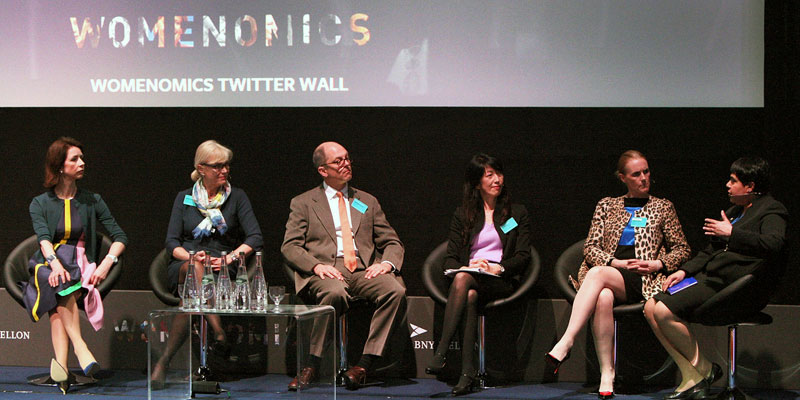Helena Morrissey joined Newton in 1994 as a fixed income fund manager and was appointed CEO in 2001 and she now manages more than £50bn for pension funds, charities and through funds available to individual investors. In 2010, Helena founded the 30% Club, a cross-business initiative aimed at achieving 30% women on UK corporate boards by 2015 through voluntary, business-led change, which has now become an international approach, with 30% Clubs in the US, Hong Kong, Ireland and Southern Africa. In June 2014 Helena was appointed Chair of The Investment Association, the UK’s industry trade body whose members manage £5trn.

On 8th April 2015, at a conference on Womenomics, a new global study was released that revealed women’s economic power is a key determinant of women reaching and staying on boards. The landmark global study looking at whether economic, cultural, political and legislative factors influence women’s representation and longevity on corporate boards examined 1,002 companies from the Forbes Global 2000 list across 41 countries spanning six continents and 51 industries over a ten-year period.
Empowering women outside the boardroom is key to getting women into the boardroom
The study’s most striking finding is that female economic power (expected years of girls’ education and percentage of women participating in the labour force) is one of two factors having the greatest positive impact on both female board percentage and longevity. Empowering women outside the boardroom is key to getting women into the boardroom – and keeping them there. Maternity provisions and female political power reinforce this virtuous circle.
Female directors more likely to be socially responsible and develop female talent
This result, combined with evidence that companies with more female directors are also more likely to be socially responsible, suggests that the success of women at one level can reinforce the success of women at other points in the career journey. This is a strong message.
It also corroborates our experience in the UK. Over the past four years, the doubling of women directors on FTSE 350 boards has unleashed a new resolve to develop female talent at all organisational levels, with efforts now extending right back to the classroom.
Importance of a requirement for gender diversity in a country’s corporate governance code
The other main driver of women’s progression to, and tenure in, the boardroom also echoes the UK experience. The study reveals that including a requirement for gender diversity in a country’s corporate governance code outweighs the limited value of mandatory quotas – which unsurprisingly get women on to the board but have no bearing on their ability to stay there.
Background: Womenomics
The term “womenomics” has been coined to describe the huge shift in financial power, with the prediction that by 2020 women’s pay will overtake men’s. Women now own 48 per cent of Britain’s wealth, a figure that’s predicted to rise to 60 per cent by 2025, with similar figures predicted for America. Of Britain’s millionaires, 46 per cent are female, with 24 per cent more women than men in the 18-44 age bracket.
Background: Cultural dimensions
In examining the effect of national cultural dimensions in different countries some of these factors, such as gender egalitarianism and humane orientation, have a strong effect on female board representation, but little effect on the longevity of female board tenure. Others, such as a culture recognising and rewarding assertiveness or aggressive behaviour hinder female board recruitment but conversely increase the longevity of tenure for those who make it in the first place.
The top performing countries for female economic power are Australia, Norway and Denmark while Saudi Arabia, India and United Arab Emirates are amongst the lowest.
Other findings revealed that a country’s collective values and beliefs about gender egalitarianism, humane orientation and assertiveness are bigger influencers than were previously understood. Quotas can help to get women into the boardroom but have no significant impact on keeping them there.
While the cultural picture varies globally, it is not a straightforward split between developed and developing countries. For example, gender egalitarianism has had a significant impact on increasing female board representation in Scandinavian and other European countries including France and the Netherlands. In contrast, in countries low on gender equality such as Germany, China, South Korea or Qatar, female board numbers remain low.
Likewise, countries that culturally value nurturing and humane orientation such as Sweden and Finland see a greater number of women on boards than countries such as Germany, Greece and the UK which do not replicate these values.
*The research was headed by Professor Sucheta Nadkarni from the University of Cambridge Judge Business School and commissioned by BNY Mellon and Newton Investment Management.
https://twitter.com/morrisseyhelena
https://twitter.com/30percentclub
https://www.linkedin.com/groups?gid=3684979





